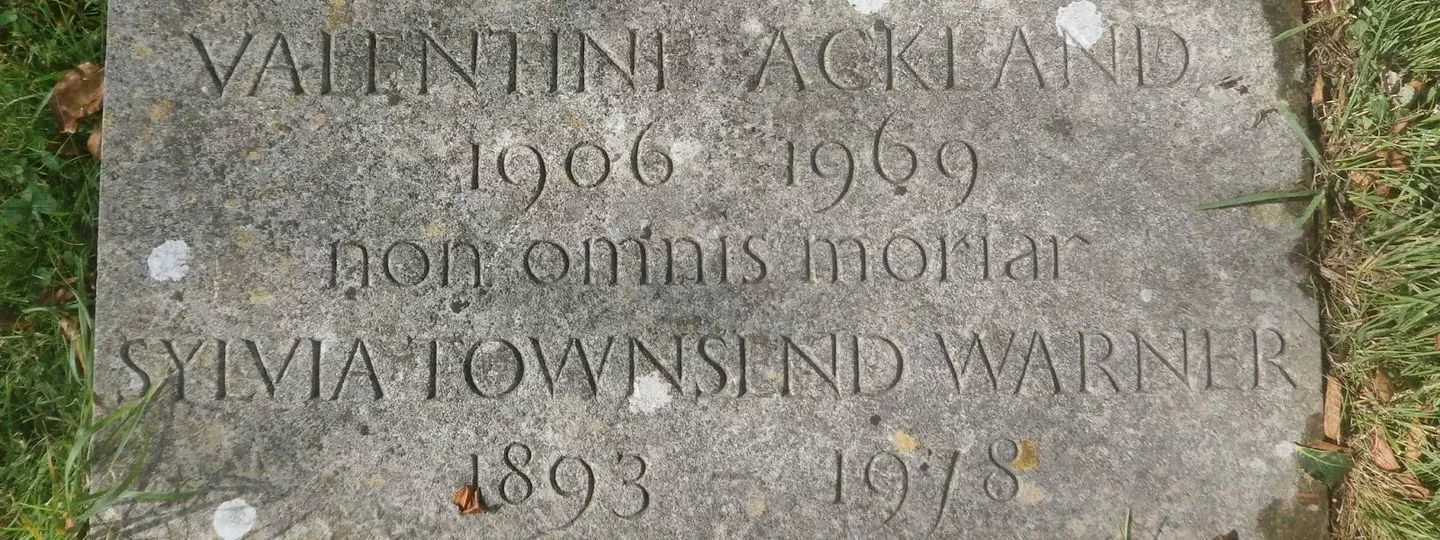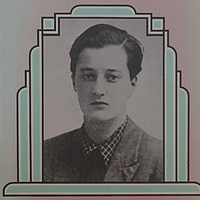
Valentine Ackland
Valentine Ackland (20 May 1906– 9 November 1969) was an English poet, an important figure in the emergence of modernism in twentieth-century British poetry.
Valentine Ackland (20 May 1906– 9 November 1969) was an English poet, an important figure in the emergence of modernism in twentieth-century British poetry.
Life
Ackland was born Mary Kathleen Macrory Ackland to Robert Craig Ackland and his wife Ruth Kathleen (née Macrory), and nicknamed “Molly” by her family. With no sons born to the family, Valentine’s father, a West End London dentist, worked at making a symbolic son of Molly, teaching her to shoot rifles and to box. This attention to Molly made her sister Joan Alice Elizabeth (b. 1898) immensely jealous. Older by eight years, Joan psychologically tormented and physically abused Molly as a way of unleashing her jealousy and anger.
Molly received an Anglo-Catholic upbringing in Norfolk and a convent school education in London. In 1925 at the age of nineteen, she impetuously married Richard Turpin, a homosexual youth who was unable to consummate their marriage. Upon her marriage, she was also received into the Catholic church, a religion that she later abandoned, returned to, and then abandoned again in the last decade of her life. In less than a year, she had her marriage to Turpin annulled, and, despite numerous pleas from her family and much psychological pressure from them, never returned to a serious relationship with a man again.
Alert to social mores of her day, she became aware of societal patterns of male privilege and female submission set about challenging the female gender identifications expected of her. She took to wearing men’s clothing, cut her hair in a short style called the Eton crop, and was at times mistaken for a handsome young boy. She changed her name to the androgynous Valentine Ackland when she decided to become a serious poet in the late 1920s. Her poetry appeared in British and American literary journals during the 1920s to the 1940s, but Ackland deeply regretted that she never became a noted and widely read poet. In this regard, much of her poetry was published posthumously, and she received little attention from critics until a revival of interest in her work in the 1970s.
In 1930, Ackland was introduced to the short story writer and novelist Sylvia Townsend Warner, with whom she had a lifelong relationship, albeit tumultuous at times given Ackland’s increasing alcoholism and infidelities. Warner was twelve years older than Ackland, and the two lived together until Ackland’s death from breast cancer in 1969. Warner went on to outlive Ackland by nine years, dying in 1978. The pair were together for thirty-nine years. Ackland’s reflections upon her relationship with Warner and the former’s long affair with American heiress and writer Elizabeth Wade White (1908–1994), were posthumously published in For Sylvia: An Honest Account (1985).
Ackland was a highly emotional woman prone to numerous self-doubts and shifts in emotions and intellectual interests. She was responsible for involving Warner in membership in the Communist Party in the 1930s and in 1937 she visited Valencia and Benicàssim within the framework of the Spanish Civil War as well as numerous socialist and pacifist activities. The two women’s involvement in the Communist Party came under investigation by the British government in the late 1930s and remained an open file until 1957, when the investigation was halted. Ackland and Warner supported the Republican cause during the Spanish Civil War, and Ackland criticised the British government for its indifference to the “sufferings of the Spanish people at the grass-roots level” in her poem "Instructions from England, 1936".
no deeper than you need
into what set these veins on fire,
Note simply that they bleed.
After World War II, Ackland turned her attention to confessional poetry and a memoir concerning her relationship with Warner and its many emotional issues as Ackland pursued involvements with other women. At first, Warner was tolerant with her younger lover’s dalliances, but the seriousness and length of Ackland’s relationship with Elizabeth Wade White was distressing to Warner and also pushed her relationship with Ackland to the edge. Ackland’s distresses at loving two women simultaneously and of endeavouring to balance her feelings for each woman with the responsibilities and commitments of her primary relationship with Warner are presented openly in Ackland’s poetry and in her memoir of this period. Ackland was struggling with additional doubts and conflicts during this period as well. She continued to battle her alcoholism, and she was undergoing shifts in her political and religious alliances. Doubts about her sexual identity and her identity as a poet as well as about her Christian faith and her political convictions are evident in her poetry.
In 1934, Ackland and Warner produced a volume of poetry, “Whether a Dove or a Seagull” that was an unusual and democratic experiment in writing as none of the poems is ascribed to either author. The volume was also an attempt by Warner to introduce Ackland to publication since Warner had an already established reputation as a novelist, and her work was widely read in the 1930s. The volume was controversial for its frank discussion of lesbianism at a time and in a society in which lesbianism was regarded as deviant and immoral behaviour.
In 1937, Ackland and Warner moved from rural Dorset to a house near Dorchester. Both became involved with Communist ideals and issues, with Ackland writing a column called “Country Dealings” concerning rural poverty for the “Daily Worker” and the “Left Review.” In 1939, the two women attended the American Writers Congress in New York City to consider the loss of democracy in Europe and returned when World War II broke out. Ackland’s poetry of this period attempted to capture the political dynamics she saw at work, but she had a difficult time as a poet mastering the craft of combining political polemics with her natural tendency toward lyrical expression. In a similar vein, her distress over the loss of democracy in Europe became a broader identification with Existentialism and the sense that the human condition itself was hopeless.
Death
Ackland died on 9 November 1969 from breast cancer that had metastasised to her lungs. She was buried together with Sylvia Townsend Warner in St Nicholas’s churchyard at Chaldon Herring with the inscription from Horace Non omnis moriar (Ode III.30, “I shall not wholly die”) on her gravestone.
Critical assessment
Ackland’s poetry—largely neglected after the 1940s—came into a resurgence of interest with the emergence of both women’s studies and of lesbian literature. Contemporary critical reaction finds much to value in Ackland’s poetry and confessional writings, which are of historical interest to the development of self-reflective, modernist poetry, and to the political and cultural issues of the 1930s and 1940s. One example of a recent critical analysis is Wendy Milford’s 1988 study, This Narrow Place: Sylvia Townsend Warner and Valentine Ackland. With regard to her self-reflection as a poet, Ackland exhibits themes and explorations similar to poets like Sylvia Plath and Anne Sexton. Of interest, too, is Ackland’s explorations of terminal illness as her life was drawing to a close from cancer. In her later years, Ackland turned from Catholicism to Quaker beliefs and also to involvement with issues of environmentalism.
In overall assessment, Milford considers the two-minds at work in Ackland’s work. She cites as examples Ackland’s focus on optimism and dread, the longing for emotional closeness and the fear of intimacy, self-assertion and self-negation, the search for privacy and solitude amidst the longing for connection and social acceptance as a lesbian and as a noteworthy poet. In this regard, Ackland shares much thematically—though not in artistic achievement—with metaphysical poets like John Donne and Philip Larkin in the effort to see personal experience from multiple perspectives and never fully resting with one perspective or another.
A contemporary examination of Ackland’s poetry and essays was published by Carcanet Press in 2008 titled Journey from Winter: Selected Poems. The volume is edited by Frances Bingham, who also provides a contextual and critical introduction.
Bibliography
Whether a Dove or a Seagull (1934) volume of poetry with Sylvia Townsend Warner
Twenty-Eight Poems (1957) privately printed in London
Later Poems by Valentine Ackland (1970)
The Nature of the Moment (1973)
Further Poems of Valentine Ackland (1978)
For Sylvia: An Honest Account (1985) a memoir of Ackland’s relationship with Sylvia Townsend Warner
This Narrow Place: Sylvia Townsend Warner and Valentine Ackland 1931–1951, by Wendy Mulford (1988)
Jealousy in Connecticut, by Susanna Pinney (1998)
References
Wikipedia—https://en.wikipedia.org/wiki/Valentine_Ackland


